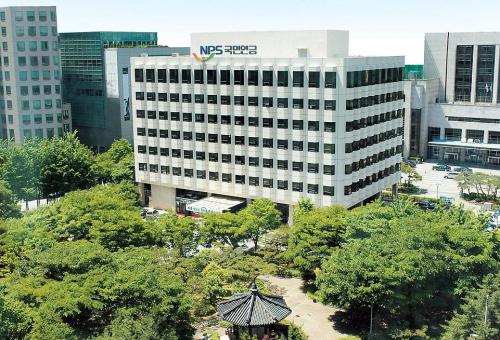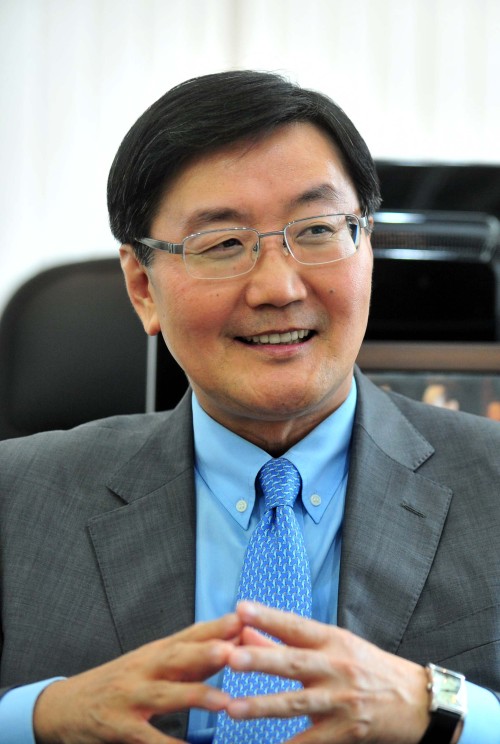 |
The headquarters of the National Pension Service in Seoul.(NPS) |
The world’s fourth-largest pension fund shifts its focus to alternative assets and foreign markets, up systematic risk management
Korea’s National Pension Service is ratcheting up its steps to strengthen and stabilize its portfolio by increasing its holdings of stocks and alternative investment, and making inroads into foreign markets.
The move comes as NPS, the biggest investor in the country’s domestic equity and fixed-income market, is witnessing a rapid expansion of its pension fund reserves. As of February this year, the total figure reached more than 360 trillion won ($317.4 billion) in pension fund reserves, up from 348 trillion won in December 2011.
Back in 2006, NPS held 189.6 trillion won, but the amount of pension fund reserves rose at a brisk pace to surpassing the 200 trillion won level in 2007 before hitting the 300 trillion won mark in 2010.
NPS said its total reserve is expected to surpass 400 trillion won by the end of 2012 and 1,000 trillion won around 2020.
NPS is now one of the four biggest pension funds in the world, drawing more attention from investors, analysts and experts in the financial markets, as its role at home and abroad is getting more important. The world’s No. 1 pension fund is Japan’s GPIF, followed by Norway’s GPF-G and the Netherlands’ APG.
Its assets are set to soon overtake those of APG to rank the third in the world, as its Dutch peer is faced with tough market conditions in connection with the protracted eurozone fiscal crisis.
Given that Korea’s stock market capitalization is now hovering around 1,000 trillion won, it seems natural that NPS is looking beyond the domestic market.
The underlying problem is that overseas markets do not have favorable conditions at all. The European market is still grappling with the fiscal debt debacle, though some progress has been made, and investors in other markets, including the U.S., remain concerned about the mixed outlook for an economic recovery.
Jun Kwang-woo, chairman of NPS, said that the Korean pension fund has been successfully dealing with the turbulent period. For instance, the NPS’ returns over the past three years came in at 63 trillion won, while its average annual yield rate reached 10.4 percent during the 2009-2010 period.

|
Jun Kwang-woo, chairman of NPS. (NPS) |
“As the reserves are on the rise, NPS will increase its investment in stocks and alternative assets, and expand its holdings of offshore assets,” Jun said. “The key to the paradigm shift is an aggressive diversification aimed at balancing investment portfolio and reducing risks.”
Jun said such diversification-based portfolio rebalancing will help NPS secure long-term income channels, thereby bolstering its burgeoning reserve’s stability.
All in all, NPS needs such a shift in strategy to beef up its investment operations and avoid a future payment crunch. It is required to support a growing number of retirees as Koreans’ average life expectancy of 80 years is one of the longest in the world and a fertility rate of 1.15 children per women is the lowest in the developed world.
NPS is also considering the market trends. As the economic growth rate stabilizes and the interest rate is at a record low in many markets, it’s getting more difficult to earn a sizable profit from investment in the fixed-income industry. NPS used to rely heavily on the fixed-income market to run its assets but the limitation is now too pronounced to ignore.
Expanding into stocks, alternative assets and offshore investment, therefore, is a key step to overcome the limitation, but NPS is also aware that selecting optimal assets and investment regions outside of Korea is crucial.
In order to optimize its portfolio of diversified assets, NPS has been already reducing its reliance on fixed-income investment over the past years. The ratio of bond investment in total portfolio was 81.1 percent in 2008 but steadily declined to 77.46 percent in 2009 and 70.7 percent in 2010. Last year, the ratio finally dipped below the 70 percent level, at 68.2 percent.
Meanwhile, the ratio of stocks in the total assets held by NPS jumped from 14.3 percent in 2008 to 23.4 percent in 2011. The figure for alternative investment jumped from 3.73 percent to 7.8 percent over the cited period.
“The increase in the portion of stocks in the assets might pose some burden on short-term returns, but its positive long-term effects outweigh such aspect, as demonstrated by other foreign pension funds,” said a spokesman at NPS said.
In the past three years, stocks brought an average return of 12.76 percent, while bonds generated an average income of 5.79 percent.
Another important platform is alternative investment, referring to non-financial assets such as real estate and infrastructure projects. NPS expects that its investment in alternative investment will help put a hedge against inflation and reduce risks through asset diversification from the volatile financial markets. NPS’ return on alternative investment in 2011, for instance, reached 10.22 percent.
In a similar vein, NPS is increasing its holdings in offshore assets in order to benefit from the cushion provided by national boundaries and different currencies.
NPS invested 16.1 trillion won, or 6.8 percent of its reserves, into foreign assets in 2008. The figure rose to 27.4 trillion won (9.8 percent) in 2009, 40.5 trillion won (12.5 percent) in 2010 and 45.8 trillion won (13.1 percent) in 2011.
“The 2011 investment performance data showed that offshore investment turned out to be better than local one in all of the fields,” NPS spokesman said, referring to the higher return of foreign investment on the stock, bond and alternative investment sectors.
Despite the diversification efforts in recent years, NPS still holds the bulk of its assets in the bond market, a higher level compared with other foreign pension operators. To address this problem, NPS said it will continue to diversify its assets while managing investment risk thoroughly.
NPS said it is setting up a systematic risk management system while forming a global network to prop up its international competitiveness.
By Yang Sung-jin (
insight@heraldcorp.com)








